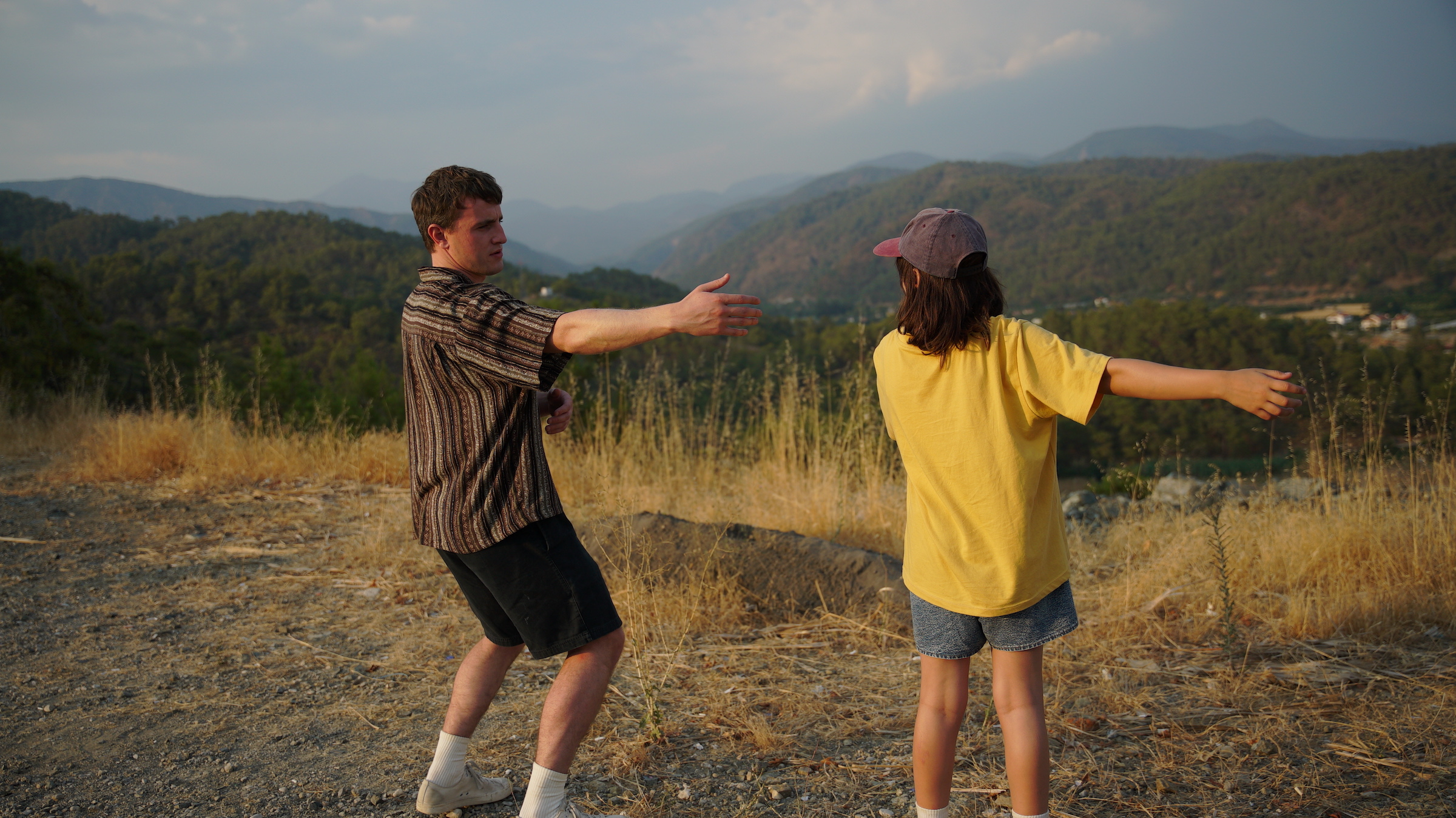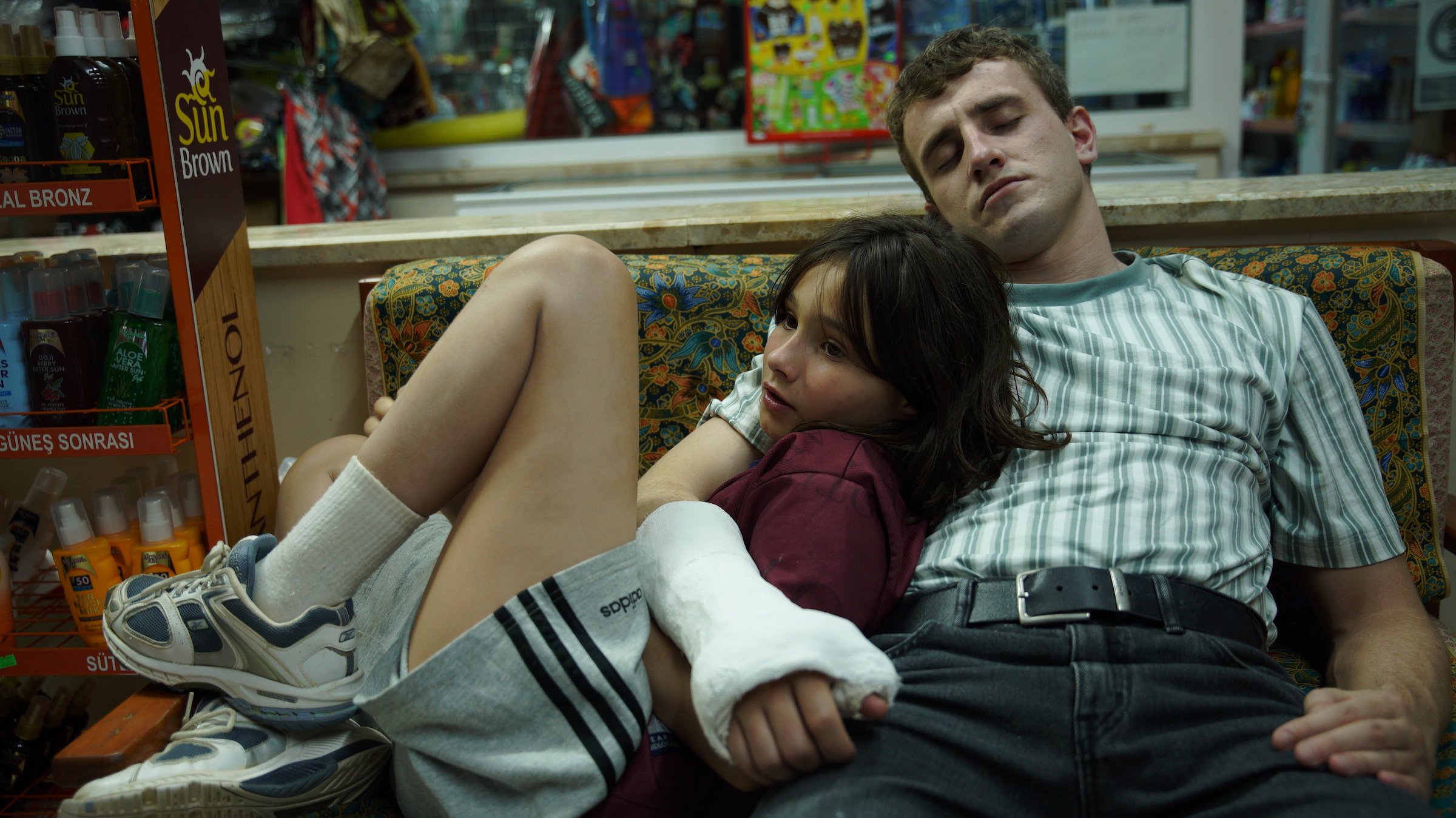
We have centuries’ worth of stories about the ways boys relate—or don’t—to their mothers. But in the movies, reflections on how girls feel about their fathers, told from a woman’s point of view, are still relatively rare. That’s the territory of Scottish writer-director Charlotte Wells’ gorgeous, resonant debut Aftersun.
The movie begins with an interrogation: It’s sometime in the mid-1990s, and 11-year-old Sophie (Frankie Corio) has turned a video camera on her father, Calum (Paul Mescal), who has taken her to Turkey for a rare holiday break. “When you were 11, what did you think you’d be doing by now?” she asks, her innocence the demanding kind, so common in the very young. Calum—whose life we know virtually nothing about, beyond the fact that he’s separated from Sophie’s mother—doesn’t want to answer the question, at least not on camera.
What follows, as this father-daughter duo play billiards together, explore local ruins, and attempt to scuba dive (until Sophie loses her mask), is a wistful acknowledgment of how little we can really understand about our parents before we become adults ourselves. What’s wonderful about Wells’ instincts, and her sense of craftsmanship, is that she never spells anything out for us. Yet we walk away feeling that we know these people, even if we aren’t clear on all the specifics of their lives.

We pick up certain things along the way: There’s something reckless about Calum—he shows up for the holiday with his arm in a cast, which he later hacks off himself. (You’re not alone if you think of Sofia Coppola’s Somewhere, another delicate, contemplative film about a similar subject.) He hasn’t been, and will not be, the best father. Though Wells’ focus is chiefly on this brief holiday, she drifts now and then to the present, where we see snapshots of the grown-up Sophie’s life. She has a partner, and a child of her own. She’s also angry at her father, resentful about something we can’t quite grasp. (Wells and cinematographer Gregory Okes give some of these sequences a dreamlike quality, almost like a child’s blurred vision of the future.) And we quickly grasp that money is a problem. It becomes clear that although Calum has scrimped for this vacation, he still doesn’t have enough to give Sophie all the things she wants, in that way children can’t help wanting things. Sophie watches as others at their small resort sail through the sky on hang-gliders, and asks Calum if they can do that too. He doesn’t answer, a non-answer that cuts like a scalpel. To be a child who wants things isn’t all that hard; plenty of us get over it. But to be a parent who can’t provide those things is excruciating, a reality we usually can’t grasp as kids, though as adults we often come to understand it. And then the idea of our parents’ anguish at failing us is wrenching for us, too.
Read more reviews by Stephanie Zacharek
The performances here are quiet marvels. Frankie is precocious and curious—she spies on some older girls, as if to divine some of their teenage secrets, and experiences her first kiss with a sweet, friendly boy who’s also on holiday with his parents. Corio moves through the performance with unstudied grace, but she shows us how perceptive Sophie is, picking up on her father’s pensiveness even as he tries to hide it from her—and even though, as a kid, she’s not supposed to have to worry about such things. It’s as if she’s filing these perceptions away for the future, knowing she can’t process them just now, with her kid-sized view of life and the world.
And Mescal is terrific, playing a man who’s going through some unnamed something that’s close to tearing him apart, even as he’s trying hard to be present for his daughter. Sometimes he loses patience with her—you see why, but it’s painful to watch even so. If only we could wish away this tension for these characters. At one point we watch, as Sophie does, as he quietly goes through some Tai Chi moves, trying to find some center that he’s lost sight of, to reach some kind of peace through muscle movement. We can’t see his face, but loneliness clings to him like a cloak. Mescal reveals without showing, communicating with us in a language that goes beyond words, or even a glance.
Later, Sophie joins him at Tai Chi, and they move in unison, probably breathing together. They belong to each other, but they’re entering a period of stress and estrangement. Aftersun takes place at the point where a father and daughter begin to lose track of each other. Reconnection either happens or it doesn’t, but either way, the passage can be bumpy. Once a daughter becomes an adult, she sometimes forgets what her father meant at this time. But Aftersun remembers.
More Must-Reads from TIME
- Introducing the 2024 TIME100 Next
- The Reinvention of J.D. Vance
- How to Survive Election Season Without Losing Your Mind
- Welcome to the Golden Age of Scams
- Did the Pandemic Break Our Brains?
- The Many Lives of Jack Antonoff
- 33 True Crime Documentaries That Shaped the Genre
- Why Gut Health Issues Are More Common in Women
Contact us at letters@time.com